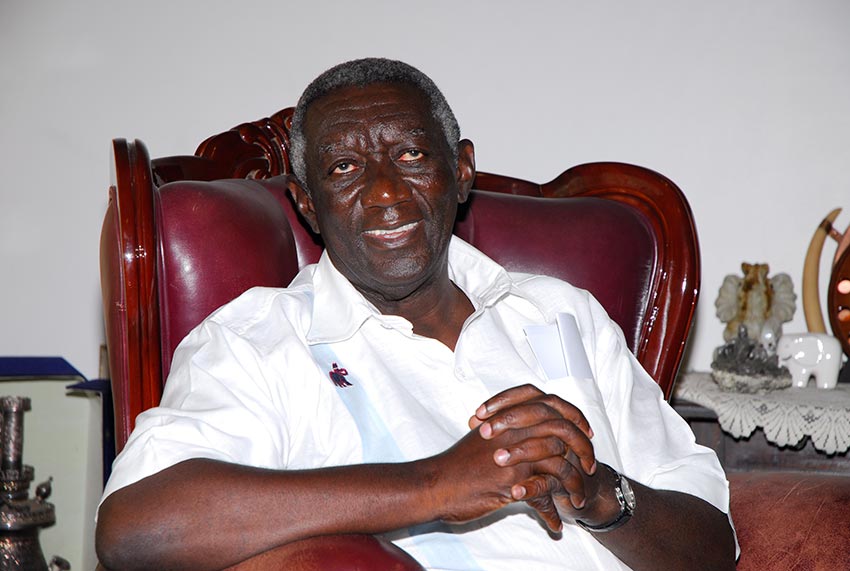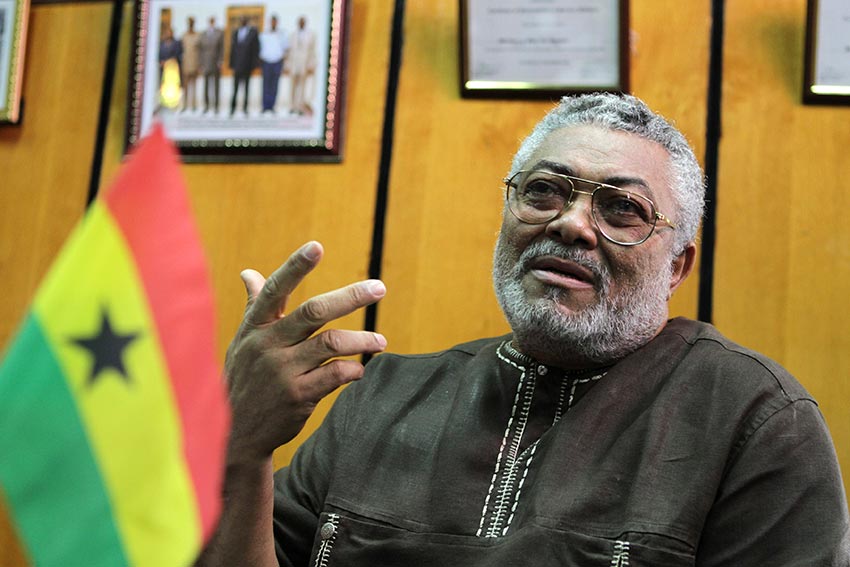Ghana’s former President John Agyekum Kufuor says people should not use his predecessor, President Jerry John Rawlings, or accept him as a measure of righteousness because the man is a hypocrite. Here are excerpts from an interview published by Africawatch in April 2010, where ex-President Kufuor explains why Rawlings continues to hurl insults at him.

Q: During your presidency, you declared “zero-tolerance” for corruption. But former President Rawlings still insists you and your government were corrupt. How do you respond?
A: As for Rawlings calling anybody corrupt, this man stands on rooftops to talk as if he is a living saint or something. A lot of the time he sounds very hypocritical, and I wouldn’t want to react to his pronouncements. I don’t think serious people should use him or accept him as a measure of righteousness in our society.
Q: When President Rawlings handed over power to you in January 2001, the relationship between the two of you was not that bad. What really went wrong between you and Rawlings?
A: You should go and ask him. As far as I am concerned, I said it before I assumed power that I would want to respect him the same way I would want to be respected when I’m out of power. When I assumed office, the first two months, things seemed to be all right until every now and then he would send an emissary to tell me to meet him at some place. It happened, first, second, and a third time. The first three I obliged but the fourth time, I sent the person back to tell him I would not meet him anywhere but at the presidency. From then on, he started raining abuses on me and it continued through the eight years that I was in power, going as far as to compare me with Ataa Ayi [one of Ghana’s most notorious and dangerous criminals]. What is he up to, I can’t understand.
Q: During your tenure of office, you stripped Rawlings of some of his protocol privileges? It was not a pretty scene, seeing the former president carry his own luggage through international airports. Why did you do that to him?
A: I want to state that I didn’t deny him any of his constitutional entitlements. I appreciate your use of the word protocol. We did that [denied him protocol courtesies] just to try and bring him to order. It is on record that for the first four or five years of our tenure, anytime he was traveling abroad and he alerted us, we availed him all the necessary protocol courtesies. For instance, the embassies abroad would accord him courtesies by sending a protocol car, with an officer to attend to his needs. In spite of these protocol courtesies, whenever he had the chance anywhere in the world, he would call a press conference and insult me. He did it in Nigeria and South Africa, and that was what broke the camel’s back.
He had gone to the wedding of President Babangida’s son in Nigeria. He notified us before he left, so the High Commission there was alerted to accord him the normal courtesies. After the wedding in Mina, that is Babangida’s hometown, Rawlings moved to the national capital, Abuja, and called a press conference at which he described me as incompetent, corrupt, and a disgrace to Ghana. Naturally, the High Commission reported back to my government about what had gone on.
Then Rawlings went to South Africa, and did an interview with the South African Broadcasting Corporation (SABC) which lasted about one hour or more; and there too, he went to town on my government, heaping abuses upon abuses on us. From South Africa too we got the report.
He came back to Ghana and stayed for a fortnight or a month, and then his secretary wrote to the then foreign minister, Nana Akufo-Addo, informing us that Rawlings intended to travel to Boston in the U.S. and that he wanted the usual courtesies to be extended to him. The foreign minister brought the letter to me and in the light of what we had experienced during his visits to Nigeria and South Africa, I instructed the foreign minister to write back to him to remind him that the word courtesy implied reciprocity, you respect me, I respect you. So if he wanted courtesies, then he should also extend courtesies back to us. Not until he showed that, he shouldn’t ask us to extend courtesies to him.
From then on we stopped advising the missions to roll the red carpet for him, to go and insult us. But his entitlements in terms of what the constitution had provided for him – whether it was about his official residence or remuneration – everything was given to him. But in terms of asking an ambassador to go to the airport to meet him and those sorts of courtesies, I couldn’t do anymore. Because the experience was that if you extend that respect, this man would abuse it. So that’s what happened.

Q: Your government spent quite a time prosecuting Rawlings’ wife, Nana Konadu Agyeman, for her alleged corrupt involvement in the sale of the Nsawam Cannery to Carridem, a company owned by the 31st December Women’s Movement, only for you to stop the trial abruptly just about the time you were leaving office. Why did you do that? And how do you respond to her claims that the trial was politically motivated?
A: The trial wasn’t politically motivated. If you look at the transactions that went on, you would see that they were not even completed. The money that should have been paid to the state [by Carridem for the purchase of the Nsawam Cannery] was not paid. It was after I assumed office that obviously they tried to complete the documents which wasn’t quite right. When the issue was brought to her notice, she rather took offence and took the initiative of taking the government to court. It was in reaction to her conduct that we decided to straighten matters with her.
Our wish was never to bring a person of her stature into disrepute, but obviously they thought they were higher than the law and so she had to be put through due process to let her know that she was as much a citizen as anyone else.
The trial lasted for about five years. If my government was really bent on being vindictive, we could have made a short shrift of it. We were just hoping that she would be a bit shocked into doing the right things with the necessary decorum. She kept on at every turn, showing utter disrespect and disdain, so we were forced to act. By the time my term ended, I had taken much of her conduct against me personally, and I advised the attorney general to stop the case. I would leave it to posterity to judge whether the acquisition they tried to make was proper.
I believe her group [the 31st December Women’s Movement] tried to acquire some credit line from China and they had expected my government to just endorse it. So when the matter was brought to my attention, I said they should be treated the same way as everybody would be treated. And I wouldn’t sign anything for them outside the normal routine. That really must have offended them [the Rawlingses] greatly. So that is part of the reason why they hate me.
Q: When Rawlings staged the December 31, 1981 coup, he appealed to the opposition parties in Ghana grouped together in the All People’s Party (APP) for help. And you and two others were nominated by the APP to serve under Rawlings. You in fact served as the Secretary for Local Government. How was it like working with Rawlings in those days?
A: I stayed there for only six months and I had to resign. I sent a letter of resignation to him, stating clearly that I didn’t understand what was going on in the country. There was so much violence; the country was under curfew, and the curfew continued for three years. People were disappearing and businesses were confiscated. It was a scorched earth country we lived in at the time. It was very dangerous and unsettling in those days. Even though I had been honored with their invitation to serve as secretary for local government, and during which time I laid the blueprint for the decentralization of local government in the country, by the end of the six months, I knew I couldn’t go on any longer.
Q: The enmity between you and Jerry Rawlings has become a source of worry to many people. Some statesmen and church leaders have tried to mediate but to no avail. What do you think it’s going to take for the two of you to patch up?
A: God knows I don’t hate him. I don’t see him as my enemy. But I would admit that, to use the British term, there is no love lost between us. I wouldn’t mind talking to him any day, man to man. But I don’t know if he will care to look me in the face and talk to me one-on-one, as we should do.